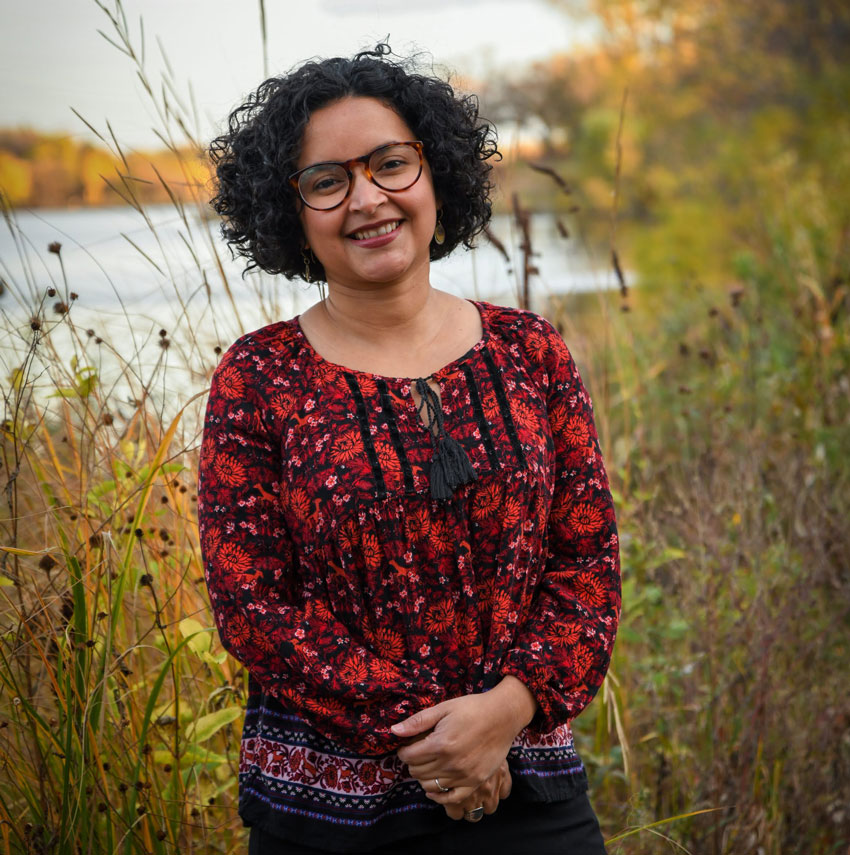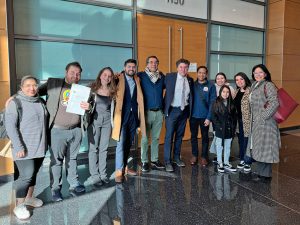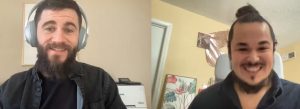I have exciting news to share! Co-founder Indira Garmendia has recently joined the team as Principal Learning Strategist.
She brings a wealth of experience to the team leading trainings on sexual and reproductive rights in her home country of Nicaragua and across Central America as well as organizing for environmental justice, and immigrant and worker rights here in the U.S.
Given the challenges we are up against now, we sat down to reflect on her experience and pull out any lessons that might be helpful.
Enjoy!

Riahl – When we met 11 years ago in Managua you were doing work that I found very interesting. It also seems relevant to the moment we are living in now in the U.S.
Can you talk about the different feminist projects you were involved in?
—
Indira – Yes, well, I was doing a lot of things. First, I was working for a feminist organization that does education on sexual and reproductive rights with young women, young men, and adult women.
They ran different training cycles, and originally I was one of the beneficiaries. For me it was an awakening, it opened my eyes…Then and there, in that process, I became a feminist.
We did a lot of education on sexual and reproductive rights, which I notice is not a topic that is discussed a lot in the United States, at least as it is recognized or spoken of there…
In Nicaragua and in Central America, feminism names sexual and reproductive rights as one of the central issues, as well as sexuality, because there are so many taboos around that and a lot of violence, a macho culture, which subjects women to a lot of violence.
For that reason there are so many unwanted pregnancies, so we talked about the right to abortion and about the right to pleasure itself, not to have sex for the purpose of reproduction, but for the purpose of simply enjoying it.
When you and I met I was at a peak in my life, because after having gone through the training cycle and having identified myself with other women, an important thing that came up and I think that was part of the success of the training, is what are we going to do now?…
Many women left wanting to do more, … so we created a [feminist] collective, and went to speak at universities.
One of the campaigns we had was to talk about love, because that is a concept that is really instilled in us women. …It is a concept that for women means giving up on their dream, giving up the things we want to do in the name of love.
…In addition to resignation, there is a lot of violence disguised as love. “I hit you because I love you. Our love will be forever. No one like me is going to love you like this.”
So we had a campaign on love to talk to young women about what love really is and how we can identify a violent relationship and rape from a healthy, loving relationship…
…In Central America it is a very difficult concept for women, there is a lot of violence in which women do not decide about their own bodies…
Nicaragua is a country where abortion is criminalized completely…In 2006, the Ortega Government made it illegal.
Who is hurt worst by making [abortion] illegal? The poorest women. Because middle-class women, urban women who live in the city have resources.
There are clandestine clinics where they can pay 300 or 400 dollars… but that, again, for poor women, for rural women, that’s not an option.
For many women who have never traveled to the city, to the capital…traveling to the city is not easy, because if she is doing it without the support of her family or her partner, leaving your home, disappearing for one to two hours, raises suspicions.
Many women cannot do it…
So I think it was in 2010, I participated in a workshop in Guatemala where they taught us how to use [a pill that we’ll call “perejíl”], which is used to perform safe, medicated abortions.
It gives autonomy to women.
It has many benefits because you can do it from home, and you can decide when to do it, unlike if you go to a clinic.
And [the pills are] very affordable… That’s how the idea of creating a network arose.
There are women in different areas of the country who were politically clear that the right to decide is a human right and that they wanted to support other women.
So we created this network in partnership with other groups across Latin America and Europe.
We started with education, teaching others the protocol on how to use it and also how to accompany a woman in contact with criminalization, because obviously publicly we did not have it on Facebook, we didn’t talk about it, this was all done secretly.
And it worked.
Many women had access thanks to that and…the women receiving the medication stayed involved and they connected us to more women.
And so that support fabric was made.
I remember that at the time we started there was a very big campaign to pass a bill to decriminalize abortion and it was a decision for us to decide where we put energy.
We decided to focus on providing access because women, meanwhile, continued to abort and continued to put their lives at risk and it was important to give them access to that right.
Of course, both things are important but we focused on access because “we need that now” and to this day, 13 years later, abortion is still criminalized in Nicaragua…
—
Riahl – Now you have all that experience and you also have years of experience as an organizer, leading teams of organizers, and campaigns in the United States.
Talk about some of the strengths, and differences of how they organized there in that context on that topic with what you have experienced here.
—
Indira – Yes, and one of the strengths in Nicaragua, I think is constant reflection, learning, and getting together, that is a very big thing.
…In the organizations where I worked, we say we have a “workshop culture” because there are so many trainings to reflect on how we feel, what we need, which, well, is a strength.
I went through those training cycles and I think that without that I would not be the person I am now, I think that my sense of justice was strengthened.
And recognizing myself as a human being and making a personal, individual, and then collective reflection is powerful.
Also, another strength in Nicaragua is the networks.
There are networks, coalitions, movements, that are together for a long time, there is no such thing as coming together just for a campaign, or a little thing, no, they are networks that stay connected.
I can tell you the network of women against violence is a network that has lasted for years and years.
…That makes the leaders get to know each other, there is a constant dialogue.
I think that working so much with a coalition or a network for years creates trust.
So that’s also a strength.
—
Riahl – And when you arrived in the United States and organized around issues of environmental justice, workers’ rights, immigrant rights, and racial solidarity, you found many differences that you shared with me about organizing here.
Sometimes we have a hard time seeing our own strengths, can you name some of those organizing strengths here?
—
Indira – Yes, I remember two things that amazed me about the work that is done here.
One, for example, is the position of the organizer.
That does not exist in Nicaragua, although it is done, here I feel that there are many tools on how to organize and clear steps to organize…Compared with Nicaragua, that does not exist.
In Nicaragua, you learn by doing.
But when I came here and, for example, the “One to One,” that was weird at first.
What is that? It’s a conversation with a person with a clear purpose.
I think we have systematized the process, so to speak, like that’s how to organize and it seems very clear to me for a person who is learning, for connecting with the community…
And the other thing is the campaigns…that are carried out to change a law, for example, of the minimum wage or other more local things, that require the work of the organizations to push into politics.
That impressed me.
They anticipate what’s coming and know how to prepare for it.
One of the advantages has to do with the democratic system.
In my country, it is not even thought about, especially at this moment, because there is a dictatorship.
But I think that with the environment or the political culture here, we can do that.
And that is what we have to take care of.
We can’t fall into an authoritarian system because then we wouldn’t be able to achieve anything…
One more thing that I noticed is that there is not much time for political education here in the U.S.
I come from organizations in the United States that do not invest a lot in political education but I feel that in Nicaragua political education is strong…
—
Riahl – Well, then, through all these experiences, you have had many lessons and right now we are in an exciting moment that you have officially joined the Learning to Transform team, our project.
What opportunities do you see and where do you want to support organizations?
—
Indira – Well, there are many opportunities for growth and opportunities for change.
I want to support organizations to ask the question of how to grow their base, and make their base more aware and more powerful.
Many organizations know what they should be doing, but we need consistency…
And it is another approach, it is not an approach from always fighting, from war, it is an approach from well-being.
[I want to talk about] well-being in the movement, because I feel that there are many people burnt out, many people who need to focus more on themselves.
If they are well, their work and the movement will go well…I think that for people who are not in the movement, who see that we are well it also motivates them to join the movement…
This comes from my own path, as a person who is also wanting to heal and put myself first and love myself.
As organizations, I would love to create educational programs on how to integrate political education with members… from a place of love.
It sounds very hippie, but… educational trainings, educational programs for organizers on how we organize more effectively within our community, that requires knowing the community…
What is it now that they are integrated into an organization and that this topic interests them, what else are they going to do?
[I want to help] create organizational plans so that these people who are already organized can organize others from a place of love.






